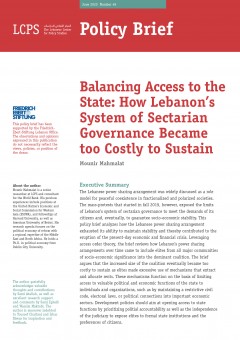|
|
 |
 PDF
June 02, 2020 | English | Mounir MahmalatBalancing Access to the State: How Lebanon’s System of Sectarian Governance Became too Costly to SustainThe Lebanese power sharing arrangement was widely discussed as a role model for peaceful coexistence in fractionalized and polarized societies. The mass-protests that started in fall 2019, however, exposed the limits of Lebanon’s system of sectarian governance to meet the demands of its citizens and, eventually, to guarantee socio-economic stability. This policy brief analyzes how the Lebanese power sharing arrangement exhausted its ability to maintain stability and thereby contributed to the eruption of the present-day economic and financial crisis. Leveraging access order theory, the brief reviews how Lebanon’s power sharing arrangements over time came to include elites from all major communities of socio-economic significance into the dominant coalition. The brief argues that the increased size of the coalition eventually became too costly to sustain as elites made excessive use of mechanisms that extract and allocate rents. These mechanisms function on the basis of limiting access to valuable political and economic functions of the state to individuals and organizations, such as by maintaining a restrictive civil code, electoral laws, or political connections into important economic sectors. Development policies should aim at opening access to state functions by prioritizing political accountability as well as the independence of the judiciary to expose elites to formal state institutions and the preferences of citizens. PDF
June 02, 2020 | English | Mounir MahmalatBalancing Access to the State: How Lebanon’s System of Sectarian Governance Became too Costly to SustainThe Lebanese power sharing arrangement was widely discussed as a role model for peaceful coexistence in fractionalized and polarized societies. The mass-protests that started in fall 2019, however, exposed the limits of Lebanon’s system of sectarian governance to meet the demands of its citizens and, eventually, to guarantee socio-economic stability. This policy brief analyzes how the Lebanese power sharing arrangement exhausted its ability to maintain stability and thereby contributed to the eruption of the present-day economic and financial crisis. Leveraging access order theory, the brief reviews how Lebanon’s power sharing arrangements over time came to include elites from all major communities of socio-economic significance into the dominant coalition. The brief argues that the increased size of the coalition eventually became too costly to sustain as elites made excessive use of mechanisms that extract and allocate rents. These mechanisms function on the basis of limiting access to valuable political and economic functions of the state to individuals and organizations, such as by maintaining a restrictive civil code, electoral laws, or political connections into important economic sectors. Development policies should aim at opening access to state functions by prioritizing political accountability as well as the independence of the judiciary to expose elites to formal state institutions and the preferences of citizens.
|
|




